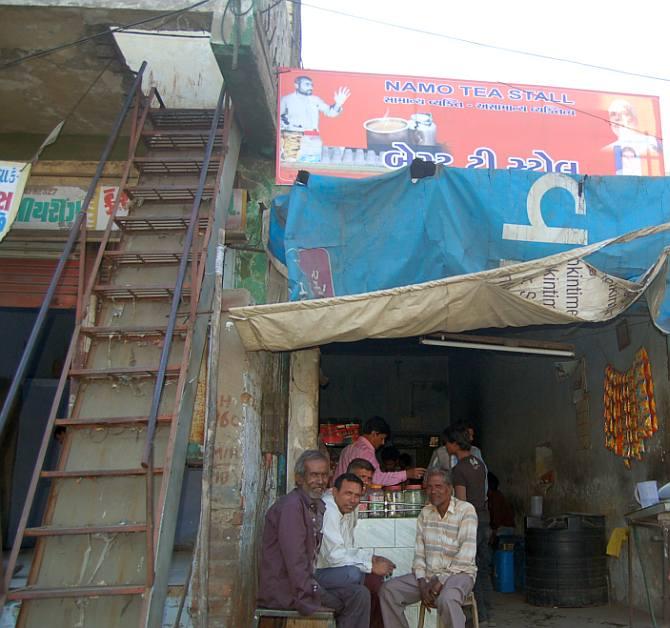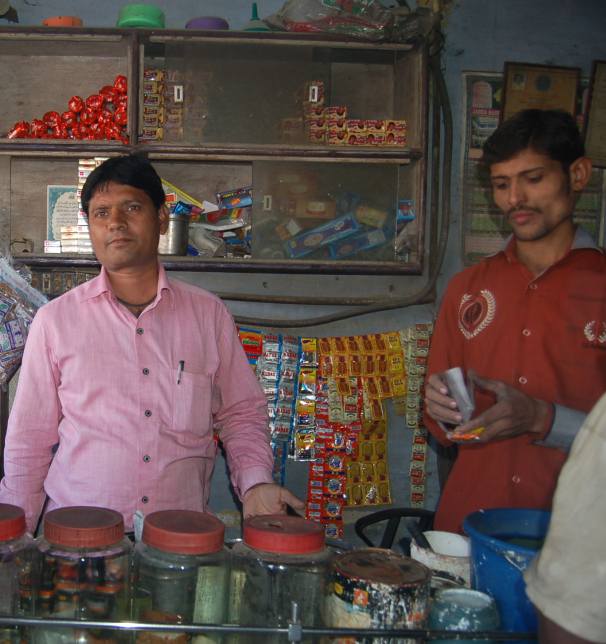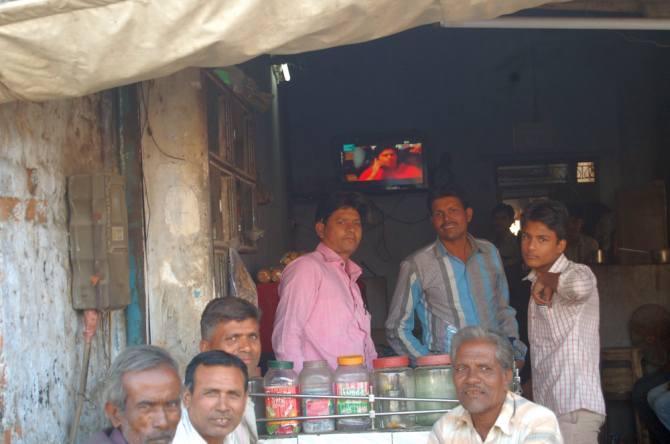 | « Back to article | Print this article |
'Who are we to forgive Narendra Modi?'
Many Muslims in Ahmedabad today have come a long way since the brutal riots of 2002, and see genuine hope in Narendra Modi as they admit that they haven’t been excluded from the circle of development. Prasanna D Zore, who visited the city recently, reports.
Sone ki Chawl in Ahmedabad’s Gomtipur area is not difficult to find. A hot spot in the aftermath of the Godhra riots of 2002, its denizens, predominantly Muslims, mostly labourers, contractors, truck drivers and petty workers, have seen, quite ironically, a steady rise in property rates ever since.
Salimbhai, an unemployed jovial fellow in his late 30s, is hanging outside Best Tea Stall, with a bunch of friends sipping tea. It is 5 in the evening and there is still an hour to go before Gujarat Chief Minister Narendra Modi will debut in the Chai Pe Charcha programme to take questions on ‘good governance’.
Salimbhai and his friends instead had begun their discussions over the state of affairs in Gujarat and India. They are at it all the time, informs Salimbhai, touching his taveez (an Islamic amulet) with his fingers and then kissing it.
They have been regulars at the Best Tea Stall for almost two years now but the frequency of their discussions and intensity of their debate has been on an ascent since last Sunday when Prakash Gurjar, vice president of Bharatiya Yuva Morcha, rebranded their favourite tea haunt as NaMo Tea Stall.
All Gurjar and his associates did was they strung a huge saffron banner across Best Tea Stall. The banner sports two avatars of Narendra Modi: one from his youth days when he had a black beard and the recent one with a white beard. Just under the latter is a picture of Zubair Shaikh, the once-shy-and-unknown-but-now-famous, owner of Best Tea Stall.
Kindly click NEXT to read further…
'Now people will start looking at chaiwallas with respect'
Nobody intimidated or enticed us to put this banner on my tea shop. I did it of my own free will,” says Shaikh. “I think because of this people will start looking at chaiwallas with respect”.
A mild-mannered gentleman, Shaikh smiles gently every time he is asked about Modi’s Chai Pe Charcha.
Shaikh, like many who visit his tea stall, the most famous being Qutubuddin Ansari, the face of post-Godhra riots, has overcome the bitterness of those three days that devastated the lives of many residents of Rehmat Nagar in Sone Ki Chawl.
“For 36 hours we felt like trapped animals inside our cages with mayhem happening all around us. There was no food, no water,” Shaikh says calmly.
He points towards the left and right of the road facing his tea shop and says, “From Rajendra Nagar to Rehmat Nagar every Muslim shop was burnt systematically.”
Twelve years have passed since. Most of the riot-affected have rebuilt their lives from scratch and, ironically, feel that their wealth has doubled and tripled.
“Look at the two-storeyed pucca houses here,” says Salimbhai pointing towards the haphazard yet pucca houses lining the opposite sides of the street.
“The riots were good for us,” he says in a tone that makes it difficult to find any iota of sarcasm. “You know the prices of our houses have increased many times because of the riots,” his smile still genuine and devoid of cynicism. Salimbhai, Shaikh and Salahuddin Kasam, a truck driver and another regular at the Best Tea Stall, accompanied by four more of their friends enjoy a hearty laugh.
You reason with them that everybody wants progress and prosperity but not at a cost that these residents have suffered, and you get a lecture that sounds like Narendra Modi attacking the Congress.
“Bloodshed happened during Congress rule in the state as well,” rebuts Kasam. “But did the Congress ever bother to talk about our well-being, education and monetary progress?”
Kindly click NEXT to read further…
'I will feel proud if Narendrabhai becomes our PM'
Shaikh nods his head in agreement. “There has been perfect peace in the state since 2002 and we have been working hard and raising our children peacefully.”
While it took its time, Shaikh says he is now a Narendra Modi supporter and has decided to vote for the Bharatiya Janata Party in the forthcoming general elections. “We all want Narendrabhai to become PM,” Shaikh avers, looking around only to be supported by his friends.
“Nobody forced me to put up the NaMo Tea Stall. I will feel proud if Narendrabhai becomes our PM and helps in reducing poverty in India. I am sure he will not discriminate against Muslims.”
“Lekin rajneeti toh kismet ka khel hai (But politics is a matter of destiny),” he adds, wondering aloud if the Gujarat chief minister will become India’s prime minister in a few months.
But Kasam feels a tad sad that no Chai Pe Charcha programme was organised in any of the city’s Muslim mohallas. “Are we not Hindustanis too? Don’t we also have the right to ask him questions about good governance?” he asks.
Do you feel that there could be riots against Muslims, as feared by his opponents, if Modi comes to power at the Centre?
“No,” says the group unanimously.
Shaikh gets philosophical when asked if he agrees with the opinion of a cross-section of Indians who pin the blame of post-Godhra riots directly on the Gujarat chief minister and if he and other Muslims will forgive him for that.
“Who are we to forgive Narendra Modi? Who are we to forgive anybody? The forgiver is sitting up there,” Shaikh says pointing skywards. “We believe that whoever has done wrong has to face the consequences here only.”
“Bus, humse kisi ka bura na ho (We pray to God that we don’t wrong others).”
TOP photo features you missed last week
Click on MORE to see another PHOTO feature...



